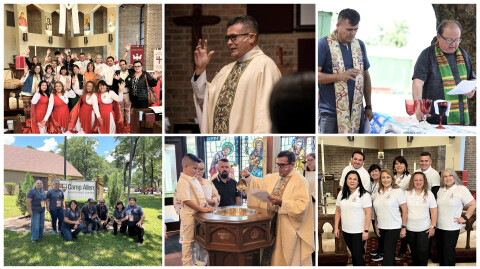TLDR[1]: God’s voice is heard in silence. Enter our church to worship and adopt a spirit of quietness while you listen to the prelude and postlude. God will encounter you in these moments of silence.
I love Holy Scripture, especially obscure little passages that don’t get as much press as more flashy passages. Let me give you an example of a passage I love. 1 Kings, Chapter 18, narrates a great showdown between 850 prophets of Baal and Asherah and the prophet Elijah. He was the lone survivor, after Queen Jezebel ordered the systematic killing of all the prophets of the Lord. Elijah was victorious in the great match, which resulted in the death of all the Queen’s prophets. Jezebel was furious and swore to Elijah, “So may the gods do to me, and more also, if I do not make your life like the life of one of them by this time tomorrow.” (1 Kings 19:3.) Terrified of losing his life, Elijah escaped into the wilderness, in the direction of Mount Horeb (Also known as Mount Sinai.) After a day’s march, Elijah wakes up to an angel of the Lord, who provided enough food for the prophet to survive an extra day. At the end of that second day, the angel provided him another ration of food, “He got up, and ate and drank; then he went in the strength of that food forty days and forty nights to Horeb the mount of God.” (19:8.) For all of us who just entered Lent, the mention of forty days and forty nights reminds us of Jesus’s time in the desert and our own march to Palm Sunday.
Once Elijah arrives at mount Horeb, he rests in a cave for the night, but in the morning, he hears a voice calling to him, “What are you doing here, Elijah?” He answered, “I have been very zealous for the Lord, the God of hosts; for the Israelites have forsaken your covenant, thrown down your altars, and killed your prophets with the sword. I alone am left, and they are seeking my life, to take it away.” (19:10.) The voice then asks the prophet to stand at the top of the mountain, for God will pass by and talk to him. In a sequence of deeply significant acts, the prophet climbs to the top and begins to look for God. First, he believes God is in a great wind, “so strong that it was splitting mountains and breaking rocks in pieces before the Lord.” Elijah expected God to make a big, dramatic entrance. “But the Lord was not in the wind.” (19:11.) After the great and terrifying wind, there was an earthquake. Certainly, this was the Lord’s dramatic and awesome power, making himself known to the demoralized prophet, “but the Lord was not in the earthquake.” (19:12.) After the earthquake, there was a fire, and by then Elijah was certain the Lord was in the fire. Exodus 3 tells us the story of the burning bush and God inhabiting that fire before Moses. Certainly, this was another such event. But the Lord was not in the fire! (19:12.) After the fire, there was sheer silence. God was in the great silence, and spoke to Elijah from the great silence. Elijah was to return to Israel. There is no escapism possible for the prophets of God. He was to launch a great revolution against Ahab and Jezebel, and he was to select new prophets for the Lord. There was work to be done and he was chosen to return to his hurt, to the birthplace of his nightmares, to the place where he had experienced his greatest defeats.
Sometimes silence is dangerous and violent. Sometimes, silence is the only place where we can hear God’s voice clearly in our lives. The God who speaks in silence often has a message that upsets the status quo and pushes us away from our comfort zones. Often, this message brings us face to face with our greatest fears. But without this message, we will never encounter the courage we need to break the chains of our past, or to claim the freedom from hurt that is our inheritance as Christians. We must be attentive at these moments of silence, and we must learn to hear the voice of the God who speaks in silence. The competing noises in our lives often seek to interrupt these moments of silence. Noise seeks self-preservation and it knows that these moments of silence are its bitter enemy. Only in these moments of silence can the truly important voices be heard. Silence is rebellion against the gods of the age, all of which compete fiercely for our precious time and attention. During brief moments of quiet respite, you place the preoccupations of the world on notice: They will not have the last word. They will not be allowed to control every second of our lives. Noise is the thief who robs us of our tranquility and peace, and we need noise-free zones where we can come face to face with the God who speaks in silence.
This brings me to a request. I have found myself distracted and overly-surrounded by chit-chat and loud voices at the start of church services over the last few weeks. It is very apparent that we love each other and want to assemble in the Narthex to greet our friends. The problem is that many of our brothers and sisters are trying very hard to enter into the “worship mood.” We want to listen to the great preludes our incredible organist has been playing, we want to close our eyes and center our thoughts on God, and we want to wait patiently for God to speak to us in silence. Our Narthex is like an echo-chamber where all sounds are magnified. Even whispers take adult form in the Narthex, and by the time they reach the nave of the church, they can be heard loudly and clearly. Please enter the sanctuary to pray and leave the socializing for coffee hour or the church grounds after the service.
Lastly, stay a while. I have noticed that people begin to leave as soon as the celebrant finishes the dismissal. Sadly, when you leave immediately after (perhaps attempting to beat other churches to the local restaurants) you miss the incredible postludes Krista has been playing. I know sometimes you have to leave because of prior commitments. If this is the case, do it quietly and reverently and wait until you have exited the church to engage in conversation with others. If you can stay, however, just sit back down after the dismissal, close your eyes, and enjoy the beautiful postludes. It may be that God will wait until the postlude to speak to you. You don’t want to miss his message.
I ask all ushers, vestry of the day, serving ministers, acolytes and acolyte masters, and others who are in charge of the services to lead by example and to model a spirit of quiet reverence at the start and end of all services. Thank you all for your help in this matter,
Blessings to you,
Fr. Roman+
[1] TLDR: “Too Long; didn’t read.” TLDR statements summarize the content of an article in a phrase or two for those people who will chose not to read it (for whatever reason.)





